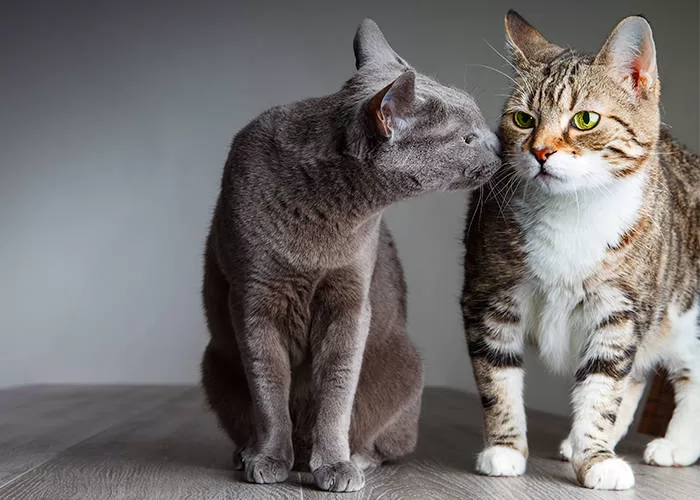Genetics plays a fundamental role in defining the special characteristics of cats . Fur color , for example, is determined by the genes present on the X chromosomes. Male cats have only one X chromosome and can be black or orange, while female cats have two X chromosomes and can have three colors. Additionally, Maine Coon cats are known for their largeness and dense coat, characteristics that developed due to natural selection and adaptation to the North American environment. However, these cats are also predisposed to certain health conditions , such as hypertrophic cardiomyopathy and hip dysplasia.Special care , such as regular brushing of the fur and an adequate diet, are important to maintain the health of these cats.
Main points to note:
- The color of cats’ fur is determined by the genes present on the X chromosomes;
- Male cats can be black or orange, while females can be three colors;
- Maine Coon cats have large, dense coats due to natural selection and adaptation;
- Maine Coon cats are predisposed to certain health conditions , such as hypertrophic cardiomyopathy and hip dysplasia;
- Special care , such as regular brushing of the coat and proper diet, is necessary to maintain the health of Maine Coon cats .
The genetic influence on cat fur color
The color of cats’ fur is determined by genes present on the X chromosomes. The genes responsible for fur color are located on these chromosomes and are transmitted differently between males and females. While male cats have only one X chromosome, females have two. This leads to differences in inheritance and the range of colors possible in cats.
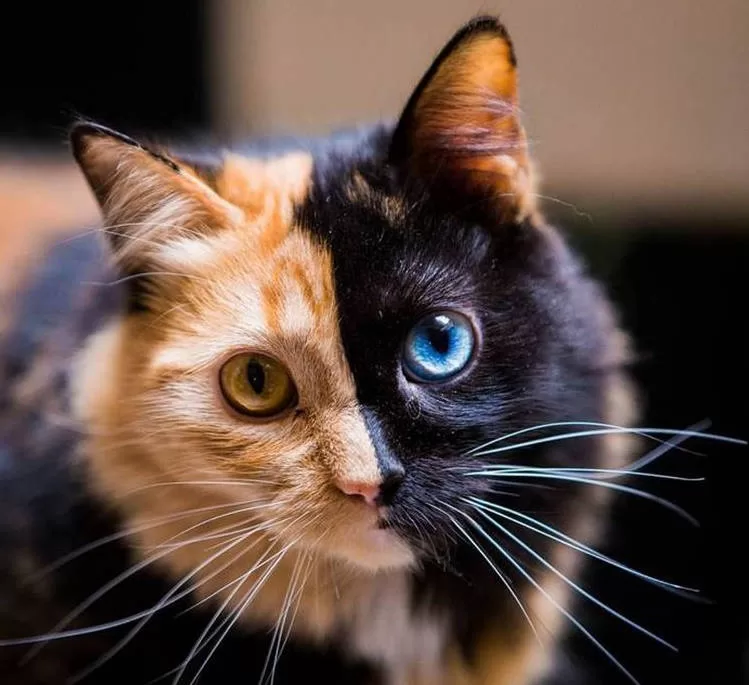
For male cats, fur color is determined by a single gene present on the X chromosome. They can be black or orange, depending on whether the gene responsible for the black or orange color is present. Females have the possibility of having three colors in their fur. This is because they have two X chromosomes and can inherit different combinations of genes responsible for the colors black, orange and dilution.
Furthermore, the white color in cats is related to specific genes. There are three different genes that may be responsible for the white color in felines. However, the presence of these genes does not always guarantee a completely white coat, as other genetic factors can also influence coat pigmentation. The combination of these genes and their interaction with other factors is still the subject of study and research in the area of feline genetics .
The genetics of fur color in cats
To better understand how genetics influence the color of cats’ fur, it is necessary to analyze the different genes involved in this process. Table 1 summarizes the main genes and their characteristics related to determining fur color in cats.
| Gene | Fur Color |
|---|---|
| O | Black |
| O | Orange |
| B | Completely white coat |
| W | White coat with colored spots |
These genes act in a complex way and can interact with each other, resulting in different combinations and color variations in cats’ fur. Understanding these genetic mechanisms contributes to the study of the heredity of coat colors and to the advancement of knowledge in the area of feline genetics.
Coat color genetics is just one of the many ways that genetics influence the characteristics of cats. Genetic diversity is responsible for the wide variety of breeds and unique characteristics found among felines. Understanding the influence of genetics on the appearance and behavior of cats allows us to further appreciate the complexity and beauty of these fascinating animals.
The mystery of the white color in cats.
The white color in cats is linked to different specific genes. While fur color in other felines is determined by genes present on the X chromosomes, white color is influenced by separate genes. There are three known genes that are related to white fur in cats, each with its own function and characteristics.
One of the genes associated with white color is the W gene, responsible for the lack of pigmentation in the coat. When a cat has two copies of this gene, it will have a completely white coat. The S gene, in turn, is associated with the size and distribution of white spots in the hair. Finally, the G gene is responsible for the eye color of white cats, which can result in blue, green or odd-numbered eyes.
Although white color is considered a desirable trait in some cat breeds, such as the Persian and the Burmese Sacred, it is important to mention that white cats with blue eyes are more prone to hearing problems due to the genetic correlation between the lack of pigmentation and congenital deafness. Therefore, for those who have white cats with blue eyes, it is essential to be aware of this predisposition and offer even more special care to their animals.
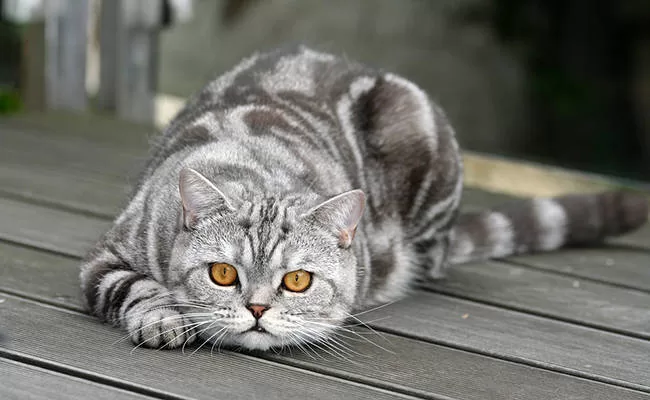
In short, genetics plays a key role in determining the color of a cat’s coat. While most colors are influenced by genes present on the X chromosomes, white color is controlled by separate genes. Understanding these genetic mechanisms helps us unravel the mysteries behind the unique characteristics of felines and provide the care necessary to ensure their well-being.
| Genes | Functions |
|---|---|
| Gene W | Lack of pigmentation in the coat |
| Gene S | Size and distribution of white spots on the coat |
| Gene G | Eye color of white cats |
The genetics of Maine Coon cats
Genetics plays an important role in the characteristics of Maine Coon cats . These felines are known for their largeness and dense coats, which have developed over many years of natural selection and adaptation to the North American environment. Therefore, it is fascinating to explore how genetics contribute to the distinctive characteristics of these remarkable cats.
Maine Coon cats have a unique combination of genes that give them their impressive size and thick coat. During natural selection, the cats that best adapted to the adverse climatic conditions of the North American region survived and reproduced, transmitting the genes responsible for these characteristics. Today, genetics continues to play a key role in maintaining these traits across generations.
In addition to their distinct physical characteristics, Maine Coon cats can also be predisposed to certain health conditions . For example, hypertrophic cardiomyopathy, a common heart disease in felines, is more prevalent in this breed. Likewise, hip dysplasia, a condition that affects the hip joints, may also occur more frequently in Maine Coon cats due to genetic factors.
To ensure the health and well-being of these felines, special care is essential. Regular brushing of the coat is very important to avoid the accumulation of loose hair and prevent skin problems, such as dermatitis. Additionally, an appropriate diet with breed-specific foods can help promote heart and joint health in these cats. Therefore, when adopting a Maine Coon cat, it is important to be aware of the special needs related to its genetics and provide the care necessary for a healthy and happy life.
| Characteristics of Maine Coon cats | Health features |
|---|---|
| Big size | Hypertrophic cardiomyopathy |
| Dense and long coat | Hip dysplasia |
| Big, tufted ears |
In short, genetics play a crucial role in the characteristics of Maine Coon cats. Their distinctive traits, such as their large size, dense coat and tufted ears, are the result of centuries of natural selection and adaptation to the environment. However, it is important to keep in mind that this breed may also be predisposed to certain health conditions. Therefore, special care, such as regular brushing of the fur and an adequate diet, are essential to maintain the health of these wonderful cats.
Genetic predisposition to health conditions in Maine Coon cats.
Maine Coon cats have a genetic predisposition to certain health conditions. It is important to be aware of these conditions and take preventative measures to ensure the well-being of these felines.
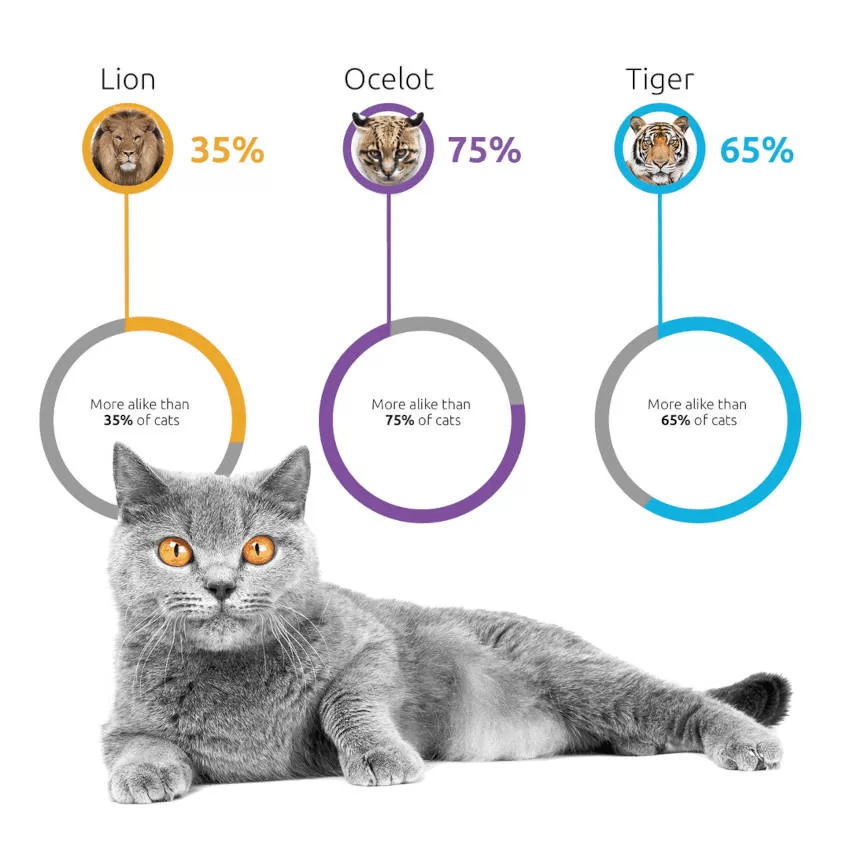
One of the most common conditions affecting Maine Coon cats is hypertrophic cardiomyopathy, a disease that affects the heart muscle. This hereditary condition can lead to serious complications and even death. Therefore, it is essential that Maine Coon cat owners perform routine exams and monitor their pet’s heart health.
Another condition that Maine Coon cats are predisposed to is hip dysplasia, a condition that affects the hip joints. Hip dysplasia can cause pain and difficulty in moving around in cats, negatively impacting their quality of life. It is critical that Maine Coon cat owners provide proper care and regularly see a veterinarian to detect this condition early.
Additionally, it is important to maintain a healthy, balanced diet for Maine Coon cats in order to prevent the development of other genetic-related health conditions. Consulting a veterinarian who specializes in feline nutrition and following their recommendations can help promote the overall health of this type of cat.
| Health Condition | Preventive measures |
|---|---|
| Hypertrophic cardiomyopathy | Regular exams, cardiac monitoring, appropriate treatment |
| Hip dysplasia | Proper care, routine exams, early detection |
| Balanced diets | Consult a veterinarian specialized in feline nutrition, follow recommendations |
In conclusion , Maine Coon cats have a genetic predisposition to certain health conditions, such as hypertrophic cardiomyopathy and hip dysplasia. To ensure the health of these felines, it is essential to carry out regular exams, monitor their heart health, provide adequate care and follow a balanced diet.
Special care for Maine Coon cats.
Maine Coon cats require special care to maintain their health and well-being. Due to their large size and dense coat, it is important to establish a regular brushing routine to prevent fur from tangling and matting. Brushing helps remove dead hair, stimulates blood circulation and keeps your cat’s coat clean and shiny.
Furthermore, an adequate diet is essential to ensure the health of Maine Coon cats. These felines have a tendency to gain weight, so it is important to provide them with a balanced and controlled diet in terms of quantity. Consulting a veterinarian to determine your Maine Coon cat’s specific nutritional needs can help prevent food-related health problems.
Another important aspect of special care for Maine Coon cats is attention to heart health. This breed is predisposed to hypertrophic cardiomyopathy, a condition that affects the heart muscle and can lead to respiratory problems and heart failure. Performing routine exams and monitoring your Maine Coon cat’s heart health is essential to prevent complications.
| Special Care for Maine Coon Cats |
|---|
| Regular brushing of the coat to prevent tangling and matting. |
| Balanced and controlled diet to avoid excessive weight gain. |
| Regular monitoring of heart health to prevent hypertrophic cardiomyopathy. |
Providing this special care will help keep your Maine Coon cat healthy, happy, and enjoying a long life. Remember to always consult a veterinarian for personalized guidance and to ensure your feline’s well-being.
The importance of genetics in the diversity of cat breeds
Genetics is fundamental to the diversity of cat breeds we know today. Through selective breeding, breeders have worked to develop specific traits in different breeds. These traits are passed on to puppies through genes inherited from their parents. It is for this reason that we see a wide variety of sizes, colors and coat types among cat breeds.
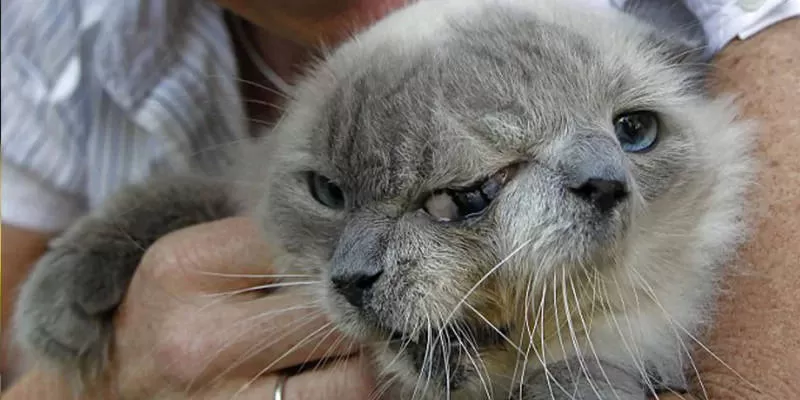
Genes play a vital role in determining a cat’s physical characteristics. They influence size, body shape, fur color and even coat texture. Some genes are responsible for characteristics exclusive to certain breeds, such as the curly coat of the Rex cat, the hairless coat of the Sphynx cat and the long, lush fur of the Persian cat.
In addition to physical characteristics, genetics also affect the temperament and behavior of cats. Some genes may predispose certain breeds to be more affectionate and sociable, while other breeds may be more independent and reserved. The study of feline genetics helps us better understand how these characteristics are heritable and how we can provide a suitable environment for each breed of cat.
| Cat Breed | Characteristics |
|---|---|
| Maine Coon | Large size, dense coat |
| Persian | Long, lush fur, flat face |
| Siamese | Short coat, intense blue eyes, slender body |
The diversity of cat breeds is a fascinating result of the influence of genetics. Each breed has its unique and charming characteristics, which are passed down from generation to generation. By understanding the genetics behind the diversity of cat breeds , we can further appreciate the beauty and complexity of these felines.
Feline genetics and behavior
Genetics plays an important role in cat behavior. Just as genetic inheritance determines coat color and other physical characteristics, it also influences specific behavioral traits. Genes can affect temperament, sociability and even predisposition to certain behaviors, such as hunting or the tendency to scratch furniture.
There are studies that indicate that some behavioral traits in cats are hereditary. For example, certain breeds may have a greater predisposition to be more active and playful, while others may be more independent and reserved. These characteristics can be influenced by genes that are passed down from generation to generation.
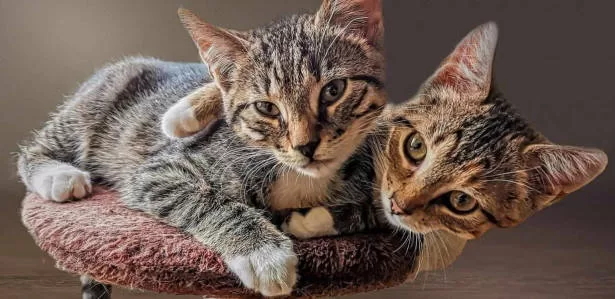
Furthermore, genetics can also influence cats’ response to external stimuli. Some cats are more sensitive to loud noises or changes in the environment, while others cope better with these situations. These differences can be attributed to genetics and the way certain characteristics are passed from parents to children.
It is important to understand that genetics are not the only factor that determines cat behavior. The environment they live in, the experiences they have had and the way they have been socialized also play a significant role. However, the study of genetics can provide us with a deeper understanding of our felines and help us create an environment suitable for their well-being.
Recent Advances in Feline Genetic Research
Feline genetic research has advanced in recent years, bringing new discoveries and treatments for hereditary diseases and understanding the unique characteristics of cats. Scientists have dedicated themselves to investigating the genes responsible for various characteristics, such as fur color, size, coat and predisposition to certain diseases.
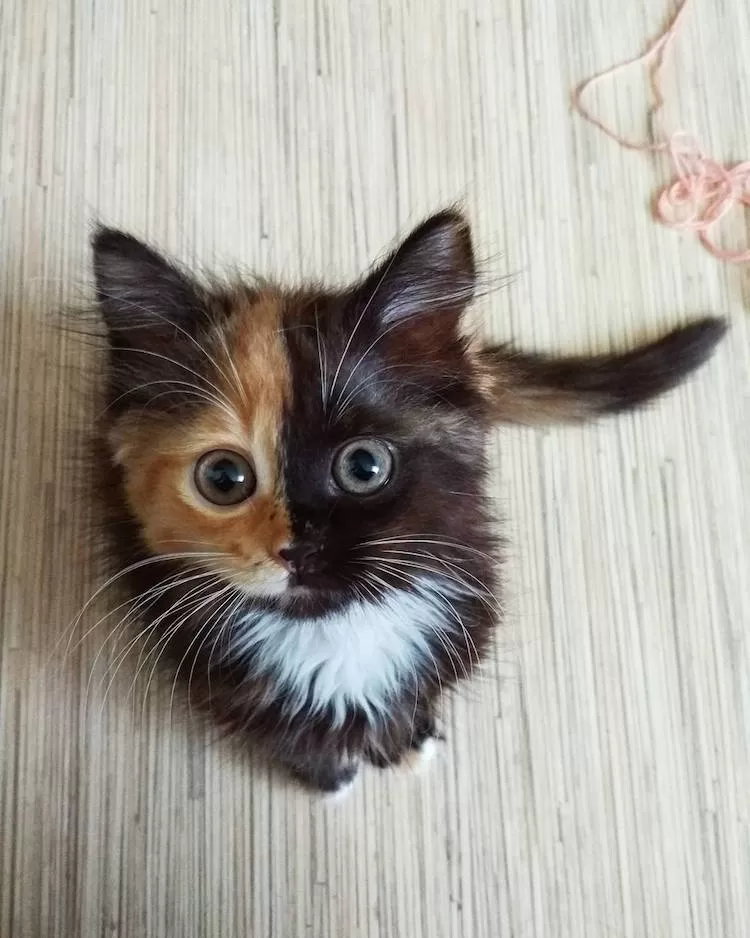
One of the most significant advances is the genetic mapping of the feline genome, which has made it possible to identify specific genes associated with distinct characteristics. For example, researchers discovered genes responsible for fur color, such as the TYR gene, which determines black pigmentation, and the OCA2 gene, related to orange pigmentation.
“Genetics has been fundamental for understanding the diversity of cat breeds and also for the development of genetic tests that help identify hereditary diseases”, says feline geneticist Dr. Carlos Silva.
Additionally, genetic research has contributed to the development of new treatments and therapies for genetic diseases in cats. For example, the identification of genes associated with hypertrophic cardiomyopathy, a heart disease common in some breeds, has allowed the development of targeted therapies to prevent or control this condition.
| Illness | Associated Genes |
|---|---|
| Hypertrophic cardiomyopathy | MYBPC3, MYH7, TNNT2 |
| Hip dysplasia | LHX4, COL2A1, FBN2 |
These advances in feline genetic research are promising and indicate a future where we will have a greater understanding of the characteristics and health of cats. Genetics will continue to play a fundamental role in identifying genetic predispositions, developing genetic tests and treating hereditary diseases in felines.
Conclusion
Genetics plays an essential role in defining the characteristics of cats and can help us take better care of our felines. The color of cats’ fur is determined by the genes present on the X chromosomes, and male cats have only one X chromosome, which makes them black or orange, while female cats have two X chromosomes, which allows them to have three different colors. Furthermore, the white color of cats is related to specific genes, and there are three different genes that influence the appearance of these felines.
Maine Coon cats are known for their largeness and dense coat, characteristics that were shaped by natural selection and adaptation to the North American environment. However, these cats are also predisposed to certain health conditions, such as hypertrophic cardiomyopathy and hip dysplasia. Therefore, it is important to take specific care of the health of these felines, including regular brushing of the fur and an adequate diet.
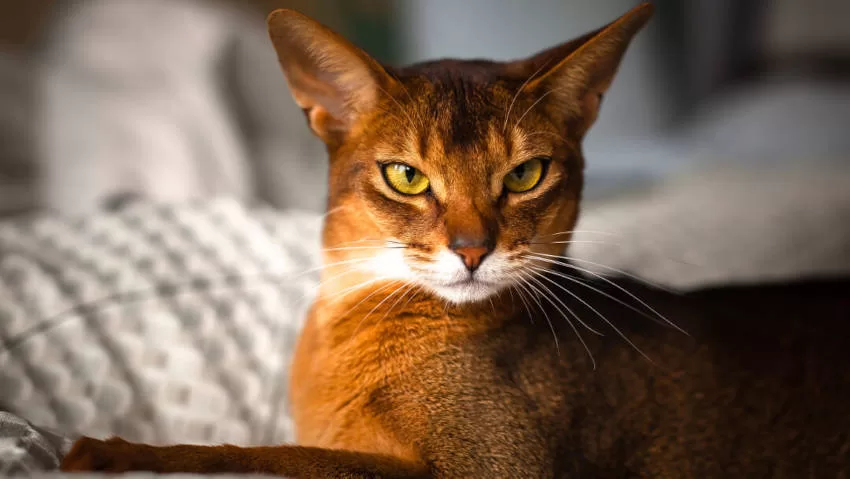
Understanding the genetics of cats helps us not only appreciate their unique characteristics, but also identify potential health problems and take preventative measures. Ongoing genetic research provides constant advances in the field of feline health, allowing us to find new ways to care for and treat our beloved cats. Therefore, genetics is a valuable tool that allows us to provide a long and healthy life for our pet felines.
FAQ
Q: How do genes determine fur color in cats?
A: The color of a cat’s coat is determined by the genes present on the X chromosomes. Male cats have only one X chromosome and can be black or orange, while female cats have two X chromosomes and can be three colors.
Q: What is the mystery behind the color white in cats?
A: The white color in cats is linked to different genes. There are three genes related to white fur in cats, and each of them can influence the feline’s appearance.
Q: How are genetics related to the Maine Coon breed?
A: The genetics of Maine Coon cats are related to natural selection and adaptation to the North American environment. These cats have developed characteristics such as large size and dense coat due to these factors.
Q: What health conditions are Maine Coon cats predisposed to?
A: Maine Coon cats are predisposed to certain health conditions, such as hypertrophic cardiomyopathy and hip dysplasia. Special care, such as a proper diet and regular brushing of the fur, is necessary to maintain the health of these cats.
Q: What special care do Maine Coon cats need?
A: Maine Coon cats need special care, such as regular brushing of their fur and a proper diet. This care helps maintain the health and well-being of these felines.
Q: How do genetics contribute to the diversity of cat breeds?
A: Genetics plays a key role in the diversity of cat breeds. Selective breeding has shaped the unique characteristics of each breed, making them different from each other.
Q: How do genetics influence feline behavior?
A: Genetics influences cat behavior. Certain behavioral traits are genetically inherited, which helps us better understand our felines and how to deal with them.
Q: What are the recent advances in feline genetic research?
A: Feline genetic research has advanced, allowing for a deeper understanding of cat health. These advances could lead to new discoveries and treatments in the area.
Q: How important is genetics in defining the characteristics of cats?
A: Genetics plays a fundamental role in defining the characteristics of cats. It influences everything from fur color to feline behavior, providing valuable information to take better care of them.
Source Links
- https://portalvet.royalcanin.com.br/guia-de-racas/maine-coon/
- https://www.nacientifico.com.br/a-genetica-da-cor-dos-gatos/

